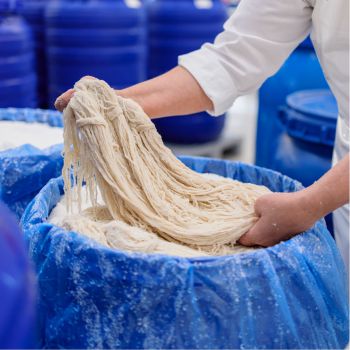"Aquab Casing Delivers with Flexible Payment Options (DA & COD) – DAP and Door-to-Door Worldwide!"
The Complete Technical Guide to Natural Sheep Casings — Composition, Halal Standards, Benefits & Industrial Application
Learn everything about natural sheep casings: composition, halal certification, processing, benefits, industrial uses, and how they compare to hog, collagen, and cellulose casings.
11/21/20254 min read


The Complete Technical Guide to Sheep Casings: Composition, Applications, Halal Status & Industry Standards
Natural sheep casings remain one of the most essential materials in the global sausage manufacturing industry. Despite the rise of synthetic alternatives such as collagen and cellulose, sheep casings continue to dominate the market for premium, thin-diameter sausages due to their superior performance, traditional appearance, and consumer preference for natural, edible sausage casings.
This comprehensive guide provides an in-depth, technical understanding of sheep casings, covering their structure, processing, characteristics, halal status, commercial applications, and differences versus other casing types. It also integrates relevant search queries such as “What are sheep casings made of?”, “Is sheep casing halal?”, “Do they still use intestines for sausage casing?”, and many more.
1. Understanding Natural Sheep Casings
1.1 What Are Sheep Casings?
Sheep casings are natural sausage casings manufactured from the small intestines of sheep. After harvesting, the intestines undergo a multi-stage cleaning, stripping, grading, and salting process to create uniform, high-quality, food-grade casings suitable for commercial sausage production.
Sheep casings are valued for:
Their thin diameter (typically 14–28mm depending on calibration)
Their tender bite
Their natural elasticity
Their clean, audible snap
Their premium appearance
In the global market, sheep casings are the preferred choice for:
Hotdogs
Breakfast sausages
Frankfurters
Cocktail sausages
Thin smoked sausages
Premium halal sausages
Artisan and gourmet products
1.2 What Are Sheep Casings Made Of?
Sheep casings are composed of the submucosa layer of the small intestine. This layer is rich in natural collagen, giving the casing:
High tensile strength
Elasticity during stuffing
Heat resistance during cooking
Edibility and digestibility
They are not artificial and contain no chemical additives, making them one of the most natural food casings available.
2. Edibility & Food Science of Sheep Casings
2.1 Are Sheep Casings Edible?
Yes. Natural sheep casings are fully edible sausage casings. Their collagen structure softens during cooking, making them easily chewable while providing a desirable “snap,” especially in hotdogs and frankfurters.
This directly answers queries such as:
“Can you eat sheep casings?”
“Is it OK to eat the casing on sausages?”
“Is sausage casing unhealthy?”
2.2 Are Sausage Casings Safe and Healthy?
Natural sheep casings are safe, healthy, and widely consumed. They are free from plastics, cellulose, and artificial binders. Nutritionally, they consist mainly of collagen, which breaks down easily during digestion.
The health profile depends on the filling—not the casing.
3. Preparation and Processing of Sheep Casings
3.1 Industrial Processing Steps
The processing of sheep casings involves:
Harvesting – Removal of intestines from slaughtered sheep.
Stripping – Removal of unwanted layers, preserving the submucosa.
Cleaning – Thorough flushing of the interior and exterior.
Grading & Calibration – Sorting by diameter (e.g., 14/16, 16/18, 18/20).
Salting – Packing in high-quality salt for preservation.
Quality Inspection – Ensuring consistent diameter, strength, and cleanliness.
3.2 How to Prepare Sheep Casings for Use
Before stuffing, manufacturers and butchers typically:
Rinse the casing to remove surface salt.
Soak in warm water (30–60 minutes).
Flush the interior with water to ensure lubrication.
Keep the casing hydrated until loading onto the stuffing horn.
Proper hydration increases elasticity and reduces breakage during high-speed stuffing.
4. Sausage Casing Materials: Natural vs Collagen vs Cellulose
Answering popular searches such as “What is casing made of?” and “Do they still use intestines for sausage casing?”:
4.1 Natural Casings (Sheep, Hog, Beef)
Edible
Traditional appearance
Elastic and durable
Preferred for premium products
Sheep casings are the thinnest natural option, ideal for small-diameter sausages.
4.2 Collagen Casings
Made from processed beef collagen.
Edible
Uniform diameter
Used in mass production
However, collagen lacks the natural “snap” of sheep casings.
4.3 Cellulose Casings
Derived from plant fibers.
Not edible
Removed after cooking
Used for skinless sausages like many hotdogs
This answers the question:
“Is cellulose casing edible?”
→ No.
4.4 Plastic Casings
Not edible
Used for processed meats, formed sausages, and large-scale smoking
5. Common Consumer and B2B Queries About Sausage Casings
5.1 What Is the Casing on Pepperoni?
Commercial pepperoni uses either:
Natural casings (edible)
Collagen casings (edible)
Cellulose casings (removed before slicing)
5.2 What Are Jimmy Dean Sausage Casings Made Of?
Jimmy Dean commonly uses:
Natural pork casings or
Edible collagen casings
5.3 What Is the Casing on Slim Jims Made Of?
Slim Jims typically use beef collagen casings—fully edible.
6. Halal Status of Sheep Casings
6.1 Is Sheep Casing Halal?
Sheep casing is halal if:
The sheep is slaughtered according to Islamic guidelines
No cross-contamination with pork occurs
Processing facilities maintain halal standards
This answers:
“Is sheep casing halal?”
“What is halal sausage casing made of?”
6.2 Can Muslims Eat Pork Casings?
No. Pork casings are haram and not permissible.
6.3 What Are Halal Sausage Casings Made Of?
Halal casings may include:
Sheep casings
Beef casings
Halal beef-derived collagen
Many food processors now demand halal-certified casings for export markets (Middle East, Malaysia, Indonesia, etc.).
7. Technical Comparison: Sheep Casings vs Hog Casings
Attribute Sheep Casings Hog Casings Diameter 14–28mm 28–42mm Texture Very tender Firmer Elasticity High Medium Common Uses Hotdogs, breakfast links, frankfurters Italian sausage, bratwurst Consumer Perception Premium Standard Snap/Bite Clean, sharp Heavier
This satisfies the query:
“What is the difference between sheep and hog casing?”
8. Do Manufacturers Still Use Intestines for Sausage Casing?
Yes. Natural casings remain the industry standard for:
High-quality sausages
Halal products
Organic and clean-label sausages
Artisanal brands
Premium export markets
Despite synthetic alternatives, natural intestine casings continue to outperform in flavor, texture, and consumer acceptance.
9. Why Global Manufacturers Prefer Sheep Casings
9.1 Functional Advantages
Higher elasticity allowing smooth, high-speed stuffing
Stronger resistance to breakage
Better adhesion to meat emulsion
Natural permeability for smoking, curing, and flavor penetration
9.2 Sensory Advantages
Superior mouthfeel
Attractive natural appearance
Ideal for “authentic” sausage positioning
9.3 Consumer Demand
Research shows consumers prefer natural casings due to:
Clean-label ingredients
No artificial additives
Better taste and texture
10. Market Applications and Industry Demand
Sheep casings are widely used in:
Meat processing plants
Halal sausage manufacturers
Hotel and restaurant suppliers
Butcher shops
Private label sausage brands
Export-driven sausage factories
Popular products include:
Hotdogs (natural casing)
Breakfast links
Cocktail sausages
Frankfurters
Chicken sausages
Mutton/beef sausages for halal markets
11. Buyers’ Guide: Evaluating Sheep Casing Quality
11.1 Key Quality Factors
When purchasing wholesale sheep casings, professional buyers evaluate:
Calibration accuracy (e.g., 14/16, 16/18, 18/20)
Uniformity of strands
Strength and elasticity
Color and odor
Salt content and preservation
Cleanliness and transparency
11.2 Packaging Types
Dry salted
Brine-packed
Net-packed
Vacuum sealed
Conclusion: Why Sheep Casings Remain the Gold Standard
Natural sheep casings continue to dominate the premium sausage industry due to their unmatched performance, clean-label profile, and consumer acceptance. Their tenderness, elasticity, and traditional appearance make them the preferred choice for high-quality sausages worldwide—across halal, organic, artisanal, and export markets.
Whether you are a food manufacturer, butcher, distributor, or procurement officer, understanding the technical and functional benefits of sheep casings is essential for consistent, high-quality sausage production.
info@aquabcasing.com
+923057608848
88/51C , Street 15 Usmanabad, Multan Pakistan
All Right Reserved by Aquab Casing @ 2023
Contact Us!
